Related Research Articles

"Happy Birthday to You", also known as "Happy Birthday", is a song traditionally sung to celebrate a person's birthday. According to the 1998 Guinness World Records, it is the most recognized song in the English language, followed by "For He's a Jolly Good Fellow". The song's base lyrics have been translated into at least 18 languages. The melody of "Happy Birthday to You" comes from the song "Good Morning to All", which has traditionally been attributed to American sisters Patty and Mildred J. Hill in 1893, although the claim that the sisters composed the tune is disputed.

"In the Mood" is a popular big band-era jazz standard recorded by American bandleader Glenn Miller. "In the Mood" is based on the composition "Tar Paper Stomp" by Wingy Manone. The first recording under the name "In the Mood" was released by Edgar Hayes & His Orchestra in 1938.
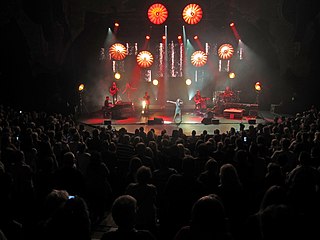
Schlager music is a style of European popular music that is generally a catchy instrumental accompaniment to vocal pieces of pop music with simple, happy-go-lucky, and often sentimental lyrics.

Harold Arlen was an American composer of popular music, who composed over 500 songs, a number of which have become known worldwide. In addition to composing the songs for the 1939 film The Wizard of Oz, including "Over the Rainbow", Arlen is a highly regarded contributor to the Great American Songbook. "Over the Rainbow" was voted the 20th century's No. 1 song by the RIAA and the NEA.
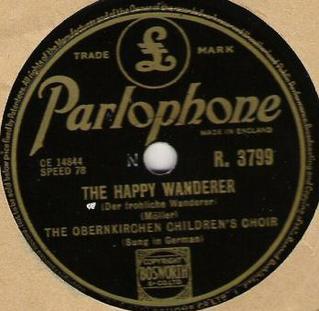
"The Happy Wanderer" is a popular song. The original text was written by Florenz Friedrich Sigismund (1791–1877).
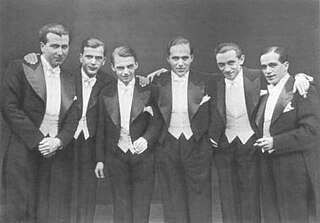
The Comedian Harmonists were an internationally famous, all-male German close harmony ensemble that performed between 1928 and 1934 as one of the most successful musical groups in Europe before World War II. The group consisted of Harry Frommermann, Asparuh "Ari" Leschnikoff, Erich A. Collin, Roman Cycowski (baritone), Robert Biberti (bass), and Erwin Bootz (pianist).

Max Raabe is a German jazz singer. He is best known as the founder and leader of the Palast Orchester.

"Medley: Aquarius/Let the Sunshine In " is a medley of two songs written for the 1967 musical Hair by James Rado and Gerome Ragni (lyrics), and Galt MacDermot (music), released as a single by American R&B group the 5th Dimension. The song spent six weeks at number one on the US Billboard Hot 100 pop singles chart in the spring of 1969 and was eventually certified platinum in the US by the RIAA. Instrumental backing was written by Bill Holman and provided by session musicians commonly known as the Wrecking Crew. The actual recording was novel at the time, being recorded in two cities, Los Angeles and Las Vegas, and being mixed down to a final version later.
Sonnenschein is a German surname meaning "sunshine" and may refer to:
"Happy Days Are Here Again" is a 1929 song with music by Milton Ager and lyrics by Jack Yellen. The song is a standard that has been interpreted by various artists. It appeared in the 1930 film Chasing Rainbows and was the campaign song for Franklin D. Roosevelt's 1932 presidential campaign. It is the unofficial anthem of Roosevelt's Democratic Party.

Scores: Songs from "Copacabana" and "Harmony" is Barry Manilow's third album with Concord Records. It features selections from two musicals that feature original music by Manilow and lyrics by Bruce Sussman.
"Irgendwo auf der Welt" is a song composed by Werner Richard Heymann for the 1932 movie A Blonde Dream . The lyrics are by Robert Gilbert.

Meret Becker is a German actress and singer.
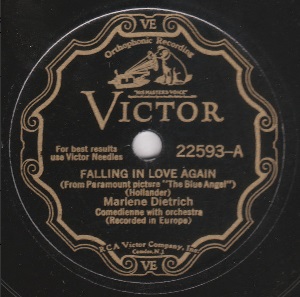
"Falling in Love Again " is the English language name for a 1930 German song composed by Friedrich Hollaender as "Ich bin von Kopf bis Fuß auf Liebe eingestellt". The song was originally performed, in the 1930 film Der Blaue Engel, by Marlene Dietrich, who also recorded the most famous English version, which became her anthem. Dietrich is backed by the Friedrich Hollaender Orchestra.

"Washboard Blues" is a popular jazz song written by Hoagy Carmichael, Fred B. Callahan and Irving Mills. It was first recorded for Gennett Records in May, 1925 by Hitch's Happy Harmonists with Carmichael on piano. It was subsequently recorded by jazz bands Original Memphis Five (1925) and Red Nichols and his Five Pennies (1926).
"Glad Rag Doll" is a 1928 song composed by Milton Ager and Dan Dougherty with lyrics by Jack Yellen. It was Ager and Yellen's first movie theme song, written for the motion picture of the same name starring Dolores Costello.
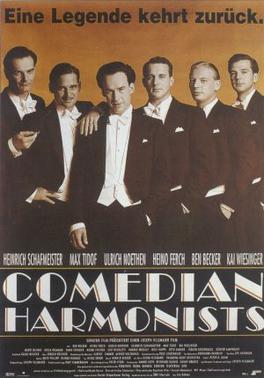
Comedian Harmonists is a 1997 German film, directed by Joseph Vilsmaier, about the popular German vocal group the Comedian Harmonists of the 1920s and 1930s. The film was supported by the German and Austrian film fund.

"The Sunshine of Your Smile" is a British popular song published in London in 1913 just before the First World War by Francis, Day and Hunter. The lyrics were by Leonard Cooke and the music by Lilian Ray. It became a top ten hit in the UK Singles Chart in 1980, sung by Mike Berry.

Die Singphoniker is a German male classical vocal ensemble based in Munich, founded in 1980 by six students of the Musikhochschule München, after the model of the Comedian Harmonists. They sing a broad repertory, from Gregorian chant to contemporary music, including Volkslieder, Christmas carols, pop music and other crossover projects. Composers such as Enjott Schneider, Max Beckschäfer and Wilfried Hiller wrote music for them. Their name alludes to "Symphoniker", inserting "sing" into a typical German name for a symphony orchestra.
Erich Adolf Max Abraham Collin was a German–American singer and the 2nd tenor in the vocal ensemble Comedian Harmonists.
References
- ↑ Fechner, Eberhard (1998). Die Comedian Harmonists. Sechs Lebensläufe (in German). Munich: Heyne. ISBN 3-453-13899-6.